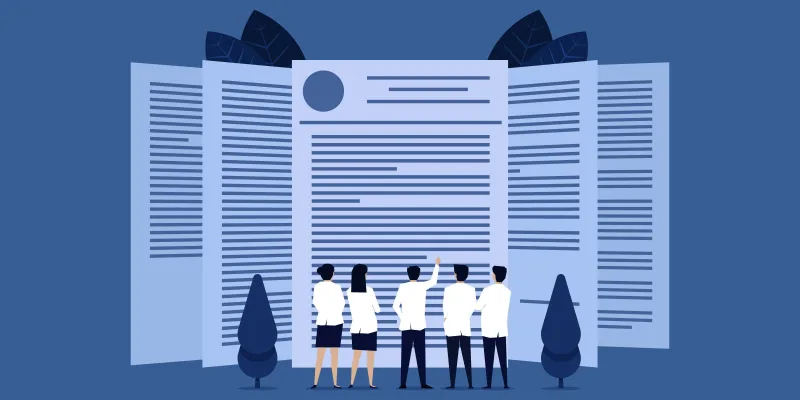It has been just over a year since Doximity released the results of a poll that asked physicians if they supported what, at the time, was a proposed rule from the U.S. Federal Trade Commission that might ban noncompete clauses in contracts. Here are some of the highlights of those poll results:
- 4,853 physicians responded
- 87% supported the proposed FTC rule to ban noncompetes
- Despite the above, 62% of respondents reported working under a noncompete
Fast forward a year and a few days, and that proposal has become a reality with the FTC voting 3 to 2 on April 23 to ban noncompetes. This rule is set to take effect 120 days after it gets published in the Federal Register — currently slated for publication on May 7 — and by the FTC’s own estimates, this ban could affect close to one-in-five American workers. Given the poll results above, you might be thinking that the vast majority of folks in the health care industry are out celebrating in the streets. As with all things U.S. health care, the reality is a little more complicated.
The debate over banning noncompete agreements within the health care industry is complex. Here, I am going to try to briefly (and hopefully fairly) touch on some of the potential negative and positive impacts of the FTC ban:
Potential negative impacts that opponents of this ban often cite:
- Disruptions to care: Opponents argue that patient care continuity may suffer as physicians transition between practices, impacting satisfaction and treatment outcomes. In a recent statement provided to Becker’s Hospital Review, the President and CEO of the Federation of American Hospitals said, “The ban makes it more difficult to recruit and retain caregivers to care for patients …”
- Organizational instability: Health care organizations reliant on noncompete agreements may struggle to retain talent and maintain operational continuity, leading to financial strain and reduced access to care. The same statement to Becker’s referenced above entails a claim that this ban creates “an unlevel playing field between taxpaying and tax-exempt hospitals."
- Legal uncertainty: Enforcing alternative restrictive covenants may lead to disputes and litigation, while the legality of nullifying existing agreements remains uncertain. Despite noncompetes already having been banned in at least nine states prior to this FTC action, roughly 43% of physicians in Oklahoma, 30% in California, 58% in West Virginia, 50% in Arkansas, 38% in Massachusetts, and 23% in Alabama still reported having a noncompete clause last year.
- Market consolidation: Increased competition could lead to market consolidation, theoretically limiting patient choice and affecting health care affordability and equity. The U.S. Chamber of Commerce has already challenged this FTC rule in court.
- Further economic implications: Organizations and physicians could incur costs associated with recruiting and retaining talent, potentially negatively impacting compensation and patient costs.
Proponents of the FTC ban often argue the following potential benefits:
- Enhanced mobility: Banning noncompete agreements allows physicians greater freedom to explore new practice settings and geographic areas, promoting professional growth. In a post-noncompete world, such technologies like Curative’s PreCheck, which aims to streamline processes like credentialing and onboarding, could provide greater flexibility to the health care workforce.
- Fostering competition: Removing restrictions encourages health care systems to improve service quality and innovate to attract talent, potentially leading to better patient outcomes, increased efficiency, and reduced costs. The FTC projects $74-$194 billion in reduced spending on physician services over the next decade.
- Promoting innovation: Physicians can engage in research and develop new treatments without contractual barriers, fostering a culture of innovation that benefits patients.
- Addressing workforce shortages: The ban can help alleviate shortages by enabling physicians to practice in underserved areas, improving access to care for vulnerable populations.
- Protecting autonomy: Physicians could stand to regain autonomy over their practice decisions, prioritizing patient care and professional fulfillment. Real physician compensation declining in the face of legislative changes has been an ongoing concern and flagged as a major contributor to feelings of overwork and burnout. This FTC ban could help stem such trends.
Given the pros and cons, what is your opinion on this FTC rule? The irony is, in health care, it still may not matter, as there is controversy over whether this rule even applies to most of us. The FTC does not have jurisdiction over not-for-profit entities and a large share of hospital systems in the U.S. are classified as not-for-profit. In its rule though, the FTC reserves the right to “evaluate” an entity’s nonprofit status, specifically stating: “Some portion of the 58% of hospitals that claim tax-exempt status as nonprofits and the 19% of hospitals that are identified as state or local government hospitals in the data cited by AHA likely fall under the Commission’s jurisdiction and the final rule’s purview.” So, as it pertains to health care workers, time will tell.
In my opinion, banning noncompete clauses within the health care industry could usher in a new era of competition, innovation, and patient-centered care. By freeing physicians from restrictive contractual obligations, policymakers can empower health care professionals to pursue opportunities that align with their professional goals and patient care objectives. However, the transition away from noncompete agreements must be carefully managed to address legal, regulatory, and economic considerations while ensuring that patient access to high-quality care remains paramount. Ultimately, this ban on noncompete clauses could represent a significant step toward a more equitable and dynamic health care system that prioritizes the needs of patients and clinicians alike.
What is your opinion on the FTC ruling? Share in the comments.
Dr. Amit Phull is emergency medicine faculty at Northwestern and Chief Physician Experience Officer at Doximity. Curative is a staffing firm backed by Doximity.
Collage by April Brust / Getty Images / Shutterstock






